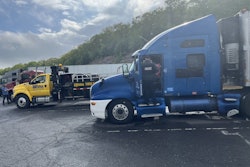Trucking news and briefs for Monday, Sept. 8, 2025:
Texas governor orders ELP enforcement on intrastate truck drivers
Texas Gov. Greg Abbott last week announced plans to "strictly enforce the English language proficiency requirements of the Federal Motor Carrier Safety Administration regulations," including for drivers who don't leave the state.
Abbott directed the Texas Department of Public Safety's Commercial Vehicle Enforcement Troopers and inspectors to conduct English Language Proficiency reviews for all commercial license operators on Texas roadways.
The FMCSA guidance on English language proficiency, updated after President Donald Trump's executive order on the matter, only applies to interstate commercial motor vehicles. However, after a heated back and forth between DOT and states about ELP enforcement, Texas announced the step of applying the English language rule to all drivers.
"Truckers play an instrumental role in Texas' robust economy and in keeping our highways safe," Abbott said in a press release announcing the move. "Every commercial driver license operator on Texas roadways must be able to communicate clearly in English to ensure compliance with traffic laws, follow safety directions, and prevent accidents. Today, I am directing DPS to enact zero-tolerance enforcement of these federal safety regulations across the board -- whether drivers are operating across state lines or only within Texas. This approach will keep Texans safe while keeping our economy moving.”
Also in the release, DPS said it had "taken enforcement action against approximately 445 commercial vehicle drivers in Texas for English proficiency violations. Of those, about 28 held Texas licenses, while roughly 336 were licensed in Mexico, with the remainder licensed in other states and countries."
Drivers with a Mexican or Canadian CDL are not eligible for out-of-service violations if they lack ELP.
Finally, Abbott directed DPS to "cease issuing intrastate commercial driver licenses for drivers that cannot speak English sufficiently to communicate with department personnel."
All CDL skills tests must take place in English, but the knowledge test component in Texas can be taken in English or Spanish, according to DPS.
[Related: Bill introduced to codify English language proficiency for truck drivers]
Truck drivers petition FMCSA to make ELP a required CDL endorsement
A bilingual truck driver and three collaborators have filed a petition for rulemaking with the Federal Motor Carrier Safety Administration proposing a new English language proficiency (ELP) commercial driver’s license endorsement.
Natasha E. Cruz-Sanchez filed the petition with the purpose of establishing “a transparent and constructive dialogue between truck drivers for whom English is a second language and the DOT.” Cruz-Sanchez collaborated on the petition with CDL A holders Nelson Gonzalez-Rivera, Edgar Rolon-Padilla, and Pedro Cancel.
The petitioners call their effort “The Safe Communication Act: English Language Proficiency Endorsement for Truckers.” They note that regulatory language around CDL qualifications “is both confusing and inconsistent -- particularly in its distinction between ‘requirements’ and ‘qualifications,’” they said. The petitioners added that the differences between those terms creates a lack of uniformity, which “fosters a subjective and sometimes biased enforcement environment.”
Their solution: Establish ELP as a formal endorsement, much like Hazmat, Passenger, Tanker, etc.
“This would make ELP a clearly testable, verifiable, and standardized credential, consistent across all jurisdictions,” the petition said. “Such a reform would enhance legal clarity, uphold safety standards, and promote fair and equal treatment for all commercial drivers.”
The group petitioned that FMCSA promulgate a rule that creates the ELP endorsement based on the Federal Aviation Administration’s (FAA) post-2008 model, which they said offers “clear criteria, three scoring categories, fair appeals.” The endorsement would be available via in-person DMV testing.
According to the petitioners, FAA requires that “all airman certificates issued since February 11, 2008, include an English proficiency endorsement.”
[Related: Florida setting up English proficiency checks at ag inspection sites]
They also propose a one-year grace period for current CDL holders, so if the rule were to come to fruition, truck drivers who currently hold a CDL would have a year to go to their DMV and apply for the endorsement. CDL applicants would also be required to obtain the endorsement before obtaining their commercial learner’s permit (CLP).
After the one-year grace period, the petitioners propose that “any CDL holder who has not obtained the required endorsement may be issued an ultimatum to downgrade their CDL to a non-commercial license, and any driver operating a commercial motor vehicle without the required endorsement is subject to being placed out of service if stopped for inspection or enforcement.”
“While we support the enforcement of ELP standards, we urge DOT and lawmakers to recognize that language alone is not the root cause of safety risks,” the petitioners conclude. “Rather, these challenges stem from broader systemic issues, including inconsistent training standards, lack of regulatory oversight across fleet sizes, and insufficient continuing education requirements. We strongly believe that professionalizing the trucking industry must start before individuals even enter trucking schools. Implementing ELP Endorsements for both prospective and current drivers will significantly improve our industry. We must address the root causes of safety issues rather than continue to apply superficial fixes. Professionalizing this industry is not only about compliance -- it’s about protecting lives and elevating the standards of an essential workforce.”
[Related: DOT to audit states' non-domiciled CDL practices]
TCA opens Elite Fleet enrollment period
The Truckload Carriers Association has opened the enrollment period for its 2026 TCA Elite Fleet program.
The certification program, created in partnership with the University of Denver’s Transportation & Supply Chain Institute, aims to spotlight and honor the North American for-hire carriers that offer best-in-class work environments, competitive compensation, and innovative practices for their drivers.
Fleets that apply for the program are evaluated based on company data and driver programs, including metrics on safety, operations, compensation, benefits, quality of life, and technology. Surveys completed by drivers and independent contractors will help validate these factors.
The program is open to TCA for-hire carrier members. Enrollment is open through Nov. 28. Certified fleets will be announced on Jan. 7, 2026. They will then be honored at TCA’s 2026 Convention from Feb. 28 to March 3 in Orlando, Florida.










